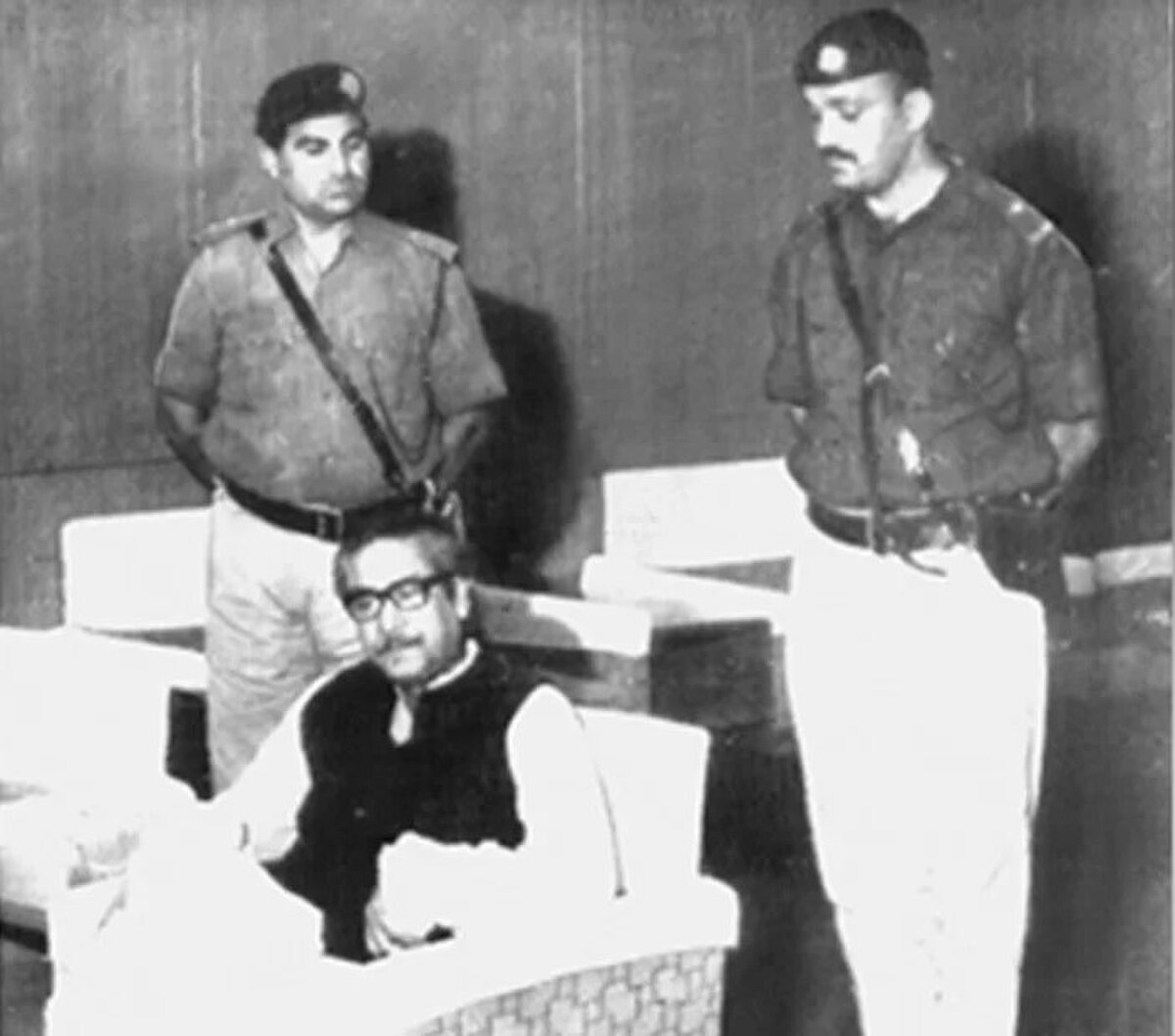
Proclamation of Bangladeshi Independence
BangladeshOn the evening of 25 March 1971, Sheikh Mujibur Rahman, the leader of the Awami League (AL), held a meeting with key Bengali nationalist leaders, including Tajuddin Ahmad and Colonel M A G Osmani, at his residence in Dhanmondi, Dhaka. They received information from Bengali insiders in the military about an imminent crackdown by the Pakistan Armed Forces. While some leaders urged Mujib to declare independence, he hesitated, fearing treason charges. Tajuddin Ahmad even brought recording equipment to capture a declaration of independence, but Mujib, hoping for a negotiated solution with West Pakistan and the possibility of becoming the Prime Minister of a united Pakistan, refrained from making such a declaration. Instead, Mujib instructed senior figures to flee to India for safety, but chose to stay in Dhaka himself.
That same night, the Pakistan Armed Forces initiated Operation Searchlight in Dhaka, the capital of East Pakistan. This operation involved deploying tanks and troops, who reportedly massacred students and intellectuals at Dhaka University and attacked civilians in other parts of the city. The operation aimed to suppress resistance from the police and the East Pakistan Rifles, causing widespread destruction and chaos in major cities.
On 26 March 1971, Mujib's call for resistance was broadcasted via radio. M. A. Hannan, the secretary of the Awami League in Chittagong, read out the statement at 2.30 pm and 7.40 pm from a radio station in Chittagong. This broadcast marked a pivotal moment in the struggle for Bangladesh's independence.
Today Bangladesh is a sovereign and independent country. On Thursday night [March 25, 1971], West Pakistan armed forces suddenly attacked the police barracks at Razarbagh and the EPR headquarters at Pilkhana in Dhaka. Many innocent and unarmed have been killed in Dhaka city and other places of Bangladesh. Violent clashes between EPR and police on the one hand and the armed forces of Pakistan on the other are going on. The Bengalis are fighting the enemy with great courage for an independent Bangladesh. May Allah aid us in our fight for freedom. Joy Bangla.
On 27 March 1971, Major Ziaur Rahman broadcast Mujib's message in English which was drafted by Abul Kashem Khan. Zia's message stated the following.
This is Swadhin Bangla Betar Kendra. I, Major Ziaur Rahman, on behalf of Bangabandhu Sheikh Mujibur Rahman, hereby declare that the independent People's Republic of Bangladesh has been established. I call upon all Bengalis to rise against the attack by the West Pakistani Army. We shall fight to the last to free our motherland. By the grace of Allah, victory is ours.
On 10 April 1971, the Provisional Government of Bangladesh issued the Proclamation of Independence which confirmed Mujib's original declaration of independence. The proclamation also included the term Bangabandhu for the first time in a legal instrument. The proclamation stated the following.
Bangabandhu Sheikh Mujibur Rahman, the undisputed leader of the 75 million people of Bangladesh, in due fulfillment of the legitimate right of self-determination of the people of Bangladesh, duly made a declaration of independence at Dacca on 26 March 1971, and urged the people of Bangladesh to defend the honour and integrity of Bangladesh.
According to A K Khandker, who served as Deputy Chief of Staff of the Bangladesh Armed Forces during the Liberation War; Sheikh Mujib avoided a radio broadcast fearing that it might be used as evidence of treason by the Pakistani military against him during his trial. This view is also supported in a book written by the daughter of Tajuddin Ahmed.
